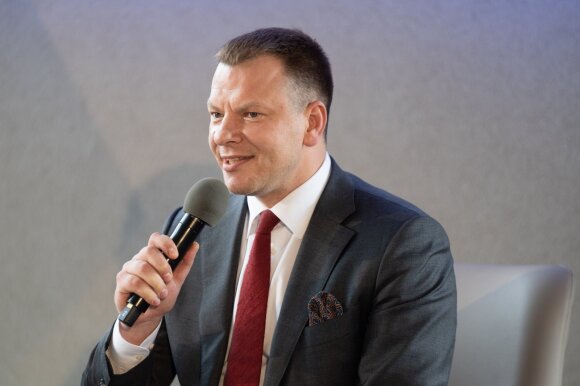
[ad_1]
Loans from 0.3 million. up to EUR 2 million, EUR 1 million in debt securities. EUR, shares and mixed measures: These measures attract large and medium-sized companies affected by COVID-19, which have been operating for at least 2 years, through a new state Business Support Fund.
The fund is managed by a new agency – UAB State Investment Management Agency (VIVA). Its CEO, Dainius Vilčinskas, explains that the new fund will invest or grant loans to large and medium-sized companies that have encountered difficulties.
“The Lithuanian economy is doing very well, but there are sectors that are experiencing difficulties and we are already communicating with various companies.” – assures D. Vilčinskas.
According to him, companies that no longer have alternatives in the financial markets can apply to the fund. For example, banks do not make loans or other investors do not invest in capital.
“The fund will have several very important objectives: to ensure the financial stability of the companies in which we will invest, to contribute to the preservation of important economic sectors for Lithuania, to preserve those companies that provide an important service or are an important employer for Lithuania, or have developed important technology; “, – spoken by D. Vilčinskas.
D. Vilčinskas explains that the collapse of large companies could have significant negative consequences: loss of jobs or the contraction of some sector.
He mentions that the fund will also contribute to the development of the country’s capital market, since in Lithuania the financing alternatives for companies are limited and this creates additional difficulties for businesses.

Raminta Stanaitytė-Česnulienė, Dainius Vilčinskas, Vilius Šapoka, Vitas Vasiliauskas, Rimantas Sinkevičius
“We hope to move this sector and promote it. (…) We hope to attract additional investors who will co-invest with the state in the fund and make the funds available to companies. ” – says D. Vilčinskas.
He assures that the state will have to gain from these investments: “We will achieve a positive return on investment.”
Currently, the amount of funds invested is 100 million. In the second stage, the company plans to distribute bonds up to 400 million euros. they will be protected by a state guarantee. In the third phase, another 500 million. It is expected to raise the amount of 1 billion euros from other investors, mainly institutional.
“The requirements and expectations of the applicants will largely depend on the instrument or instrument through which we invest.” – spoken by D. Vilčinskas.

Dainius Vilčinskas
It says debt, loan and bond securities will be prioritized and rarely considered equity contributions, but the state said it never intended to be a major shareholder.
“We will always be that smallest shareholder and there is no intensity to take over the management of the company from the shareholders in whom the fund will invest.” – Mr. Vilčinskas intervened and assured that there will be no interference in the management.
Currently, about 20 companies are interested in the investment opportunities of the fund.
“Sectors: travel, tourism, inter-institutional, hotel. However, there are also manufacturing companies that work with exports and whose markets are currently facing challenges, as well as trading companies, wholesalers and retailers ”. – assures D. Vilčinskas.
According to him, if companies were successful before the virus-induced situation, the prospects for success after the economic recovery will be assessed.
Shapoka: During the marathon and the professionals exhale
Finance Minister Vilius Šapoka explained that the new fund is one of the long-term measures to reduce the consequences of COVID-19, as in the spring the measures were mostly short-term, designed to respond quickly to the situation, and now some large companies are “breathing.”
“The main assumption was that it wouldn’t be a sprint, it wasn’t a plan to survive a month or two. This is not a sprint, but a marathon. This assumption allowed us to focus not only on short-term goals, but also to think ahead immediately. (…) Later or earlier in this marathon, there will be a glucose shortage not only for small and medium-sized companies but also for large ones’ – V. Šapoka jacket
According to him, the goal is to provide help and leave on time.

Vilius Šapoka
“This is not a tool to achieve a more planned economy”, – said V.Šapoka.
The minister stressed that the performance of the Lithuanian economy is one of the best in the EU due to the measures approved in spring, and expected good results from the fund’s activities.
“Let’s not get any illusions that there will be no pancakes in that big frying pan with many pancakes. Business is business, bankruptcy is a normal stage of the business cycle. Business models sometimes fail, adapt, or reorient.” – said the Minister.
According to him, the state, by supporting large and medium-sized companies, will help preserve the economic sectors affected and avoid the “snowball effect” that could arise if a strategically important company withdraws from the market and causes a chain reaction negative.
At the opening ceremony, the Minister of Economy and Investments, Rimantas Sinkevičius, wished that there were as few pancakes as possible.
Vitas Vasiliauskas, Chairman of the Board of the Bank of Lithuania, stated that with the establishment of the fund, the capital market in Lithuania is expanding.
“We are also talking about equity instruments, hybrid instruments and I see this project as another complementary option and as a market instrument.” – declared V. Vasiliauskas.
Previously it was announced that this fund, to which the state will contribute 100 million. and will contribute 400 million euros. it could start operating in June.
It will be managed by a new agency – VIVA
UAB Valstybės investicijų valdymo agentūra (VIVA) has commissioned a new measure to support liquidity for companies, called the Business Support Fund.
The Business Support Fund created by VIVA will help guarantee liquidity for medium and large companies, access to financing and allow companies to recover more quickly from the crisis caused by COVID-19, according to government documents.
“The fund will invest in equities, debt securities of companies operating in Lithuania, which, due to the unfavorable epidemic situation, pose a risk to the continuity of its commercial activities, in addition to granting loans to companies.
It is planned to use the funds of the fund only in cases where it is not possible for companies to attract the necessary funds from the market in other ways, ”the letter from the Ministry of Finance states.
Joint venture agreements will be signed with selected private investors through a transparent, open and non-discriminatory invitation.
VIVA itself will be managed by a supervisory board, a council and an administrator, with a capital of at least 1 million euros.
It has been announced that the fund will operate as a limited company and its limited partner will be the State Investment Capital under the Ministry of Economy and Innovation.
In May, the European Commission (EC) approved a Lithuanian state aid plan that allows investment of up to one billion in medium and large companies affected by the COVID-19 outbreak. euros.
Under this scheme, the state will invest EUR 100 million and guarantee EUR 400 million in bonds to raise funds for the fund. Another 500 million. It is planned to attract euros from private investors.
It is strictly forbidden to use the information published by DELFI on other websites, in the media or elsewhere, or to distribute our material in any way without consent, and if consent has been obtained, it is necessary to indicate DELFI as the source.
[ad_2]